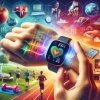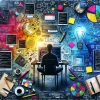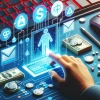
In today's fast-paced world, sleep often takes a backseat to our ever-growing to-do lists. However, the importance of quality sleep cannot be overstated—it is the cornerstone of good health, productivity, and overall well-being. Fortunately, technology offers us innovative ways to track, understand, and improve our sleep patterns. This article delves into the fascinating intersection of technology and sleep, exploring practical tools and methods to ensure you get the rest you need.
The Science of Sleep: Why It Matters
Sleep is more than just a period of rest. It is a critical process that helps our bodies repair, rejuvenate, and prepare for the day ahead. During sleep, the brain consolidates memories, the body releases growth hormones, and the immune system strengthens. Chronic sleep deprivation can lead to serious health issues, including obesity, cardiovascular disease, and cognitive decline. Understanding the science behind sleep helps us appreciate why investing in quality sleep is essential.
How Technology is Revolutionizing Sleep Tracking
Gone are the days when sleep tracking was limited to pen and paper. Modern technology offers sophisticated tools that provide detailed insights into our sleep patterns. Wearable devices like smartwatches and fitness trackers are equipped with sensors that monitor movement, heart rate, and even blood oxygen levels. These devices offer a convenient way to track sleep stages and duration, providing a comprehensive picture of your sleep quality.
Choosing the Right Sleep Tracking Device
With so many devices on the market, choosing the right one can be overwhelming. When selecting a sleep tracker, consider factors like comfort, battery life, and the type of data it provides. Some popular options include the Fitbit Charge, Apple Watch, and Oura Ring. Each of these devices offers unique features, so it's essential to choose one that aligns with your specific needs and lifestyle.
Common Mistakes to Avoid with Sleep Technology
1) Over-relying on data: It's easy to become obsessed with the numbers, but remember that sleep quality is subjective and can vary from day to day.
2) Ignoring the basics: Don't forget the fundamentals of good sleep hygiene, such as maintaining a consistent sleep schedule and creating a restful environment.
3) Using screens before bed: The blue light emitted by screens can interfere with your sleep cycle, so avoid using devices right before bedtime.
Enhancing Sleep with Smart Home Technology
Smart home devices can also contribute to better sleep. Smart lighting systems, like Philips Hue, can simulate natural light patterns to help regulate your circadian rhythm. Smart thermostats can adjust the temperature to create an optimal sleeping environment. Integrating these technologies into your home can create a more conducive atmosphere for restful sleep.
Apps to Improve Sleep Quality
In addition to hardware, there are numerous apps designed to help improve sleep. Apps like Calm and Headspace offer guided meditations and sleep stories to help you relax before bed. Sleep Cycle analyzes sleep patterns and wakes you up during your lightest sleep phase, ensuring you feel more refreshed. These apps provide valuable tools to enhance your sleep routine.
The Role of AI in Sleep Improvement
Artificial Intelligence is making its mark on sleep technology by offering personalized insights and recommendations. AI-powered apps can analyze your sleep data and provide tailored advice to improve your sleep habits. For instance, SleepScore Labs uses AI to measure sleep patterns without requiring a wearable device, offering a non-intrusive way to track sleep.
Balancing Technology and Natural Sleep
While technology offers incredible tools to track and improve sleep, it's crucial to balance these with natural sleep practices. Prioritize a bedtime routine that promotes relaxation, such as reading a book or taking a warm bath. Use technology as a complement to, not a replacement for, these time-tested methods of achieving restful sleep.
The Future of Sleep Technology
The future of sleep technology is promising, with advancements in AI, biometrics, and personalized health insights paving the way for even more sophisticated solutions. As technology continues to evolve, we can expect even greater integration of sleep tracking into our daily lives, offering new opportunities to enhance our well-being through better sleep.





























